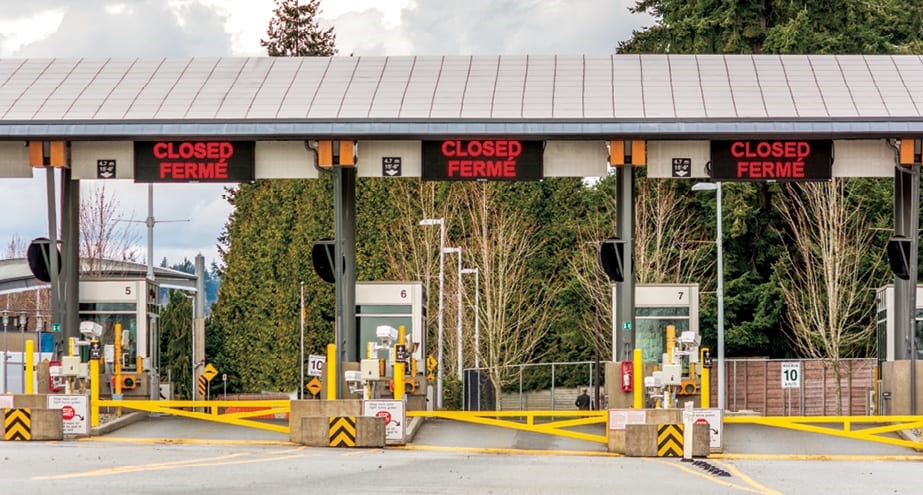It’s virtually impossible to socially distance when you work for the Canada Border Services Agency (CBSA), said Chris Schuurman, the Local 16 branch union president, who has gone public with his concerns.
Schuurman, who is stationed at Niagara Falls and has worked for CBSA for about 12 years, is calling on the government and Niagara Health to ensure that his officers are prioritized for vaccinations alongside other essential front-line workers and first responders like police, correctional staff, and paramedics.
In addition to a high volume of commercial trucks crossing into Canada at Queenston and Fort Erie that must be inspected, Schuurman said that refugees are entering the country from all over the world, especially Central and South America, as well as from the Middle East.
“It may come as a surprise to people, but we also get many refugees from the US—they usually have some kind of mental health history, or are running away from what they perceive as an oppressive government,” said Schuurman. “They've convinced themselves that they need to get out of the country, and the Canadian healthcare system is attractive to them. Some are homeless and just looking for a free meal, and they know that we can’t immediately send them back to the US. It takes us about a week to repatriate US citizens.”
He said some refugees, if identified as potentially dangerous, are detained at the Thorold Detention Centre, or at the Niagara Regional Police Service station on Stanley Avenue, in Niagara Falls. If they are not considered a threat, they would normally be placed in a local quarantine hotel for 14 days.
Vive La Casa, a program of the Jericho Road Community Health Center, in Buffalo, often provides Spanish-speaking interpreters and legal aid to refugees seeking asylum in Canada who cross along the Niagara River, said Schuurman.
“The Rainbow Bridge at Niagara Falls has a pedestrian walk, and it gets a lot of people with no appointments. They just show up,” he said. “Most of them have entered the US under a legitimate visa. Some of the refugees from Central and South America have stayed in the US for a couple years and decided they don't like it, or their visitor status has run out.”
Schuurman said that his officers have no idea if the refugees have had COVID tests beforehand.
“We don't know where they're coming from, and obviously, the variables are infinite in terms of their exposure in the United States. We get a lot of families, and they’ve traveled in airplanes and taxis and buses and trains, and not wearing face coverings.”
The main push by Schuurman is to have CBSA officers vaccinated “immediately.” He said that his officers are “overwhelmingly” eager to roll up their sleeves.
“I've been lobbying for this since January. We're enforcing the Quarantine Act, and also handling DUIs, and performing arrests under the Criminal Code. We're dealing with people with mental health crises who are unpredictable and difficult to manage,” he said.
A CBSA officer stationed at Pearson International Airport, who spoke to the Voice on condition they not be named, said that social distancing is “pretty much non-existent” during the disembarkation and immigration process at the international terminal. They said that air travellers have had a COVID test before boarding their flight to Toronto, and that arrivals are sometimes sequenced to ease the offloading congestion. But they said with some international flights, almost all passengers end up in the immigration office.
“Every Monday, Wednesday, and Friday, there are two Delhi [India] flights of almost 300 passengers, plus twice a week flights from Addis Ababa, Ethiopia,” they said.
CTV News recently reported that between March 31 and April 12, 55 international flights landed at Pearson with COVID exposures, with 16 planes having arrived from Delhi, where this spring a potent variant was present. Abu Dhabi, Dubai, Doha and Istanbul are some of the other top infection zones from which travellers bring cases into the province, according to the report.
“Air travel has been a serious contributor to the global spread. In fact, you could argue that without air travel, we wouldn’t be having a pandemic,” University of Toronto infection control epidemiologist Colin Furness, told CTV.
On Thursday, April 22, the federal government announced that incoming flights from India and Pakistan would be banned for 30 days, effective immediately. India had reported over 300,000 new infections the previous day alone.Jacqueline Callin, a media relations spokesperson for CBSA, said that in accordance with federal and provincial health authorities’ vaccination plans, border services officers are scheduled to receive the vaccine at the same time as other frontline essential workers.
“The health and safety of the travelling public and CBSA employees is of utmost importance to the agency,” she said, noting that personal protective equipment (PPE) is readily available to all frontline staff, and regular cleaning and disinfection practices of shared spaces and surfaces are in place.
Dr. Mustafa Hirji, Niagara’s Acting Medical Officer of Health, recently told the St. Catharines Standard that he expects CBSA officers will be vaccinated in the coming weeks, although top priority at this stage is being given to farm workers and educators.
In a Niagara Regional Council COVID workshop held on Zoom last Friday, Pelham Regional Councillor Diana Huson and Fort Erie Mayor Wayne Mayor Redekop advocated on behalf of border security agent vaccinations. Huson reported that Hirji presented a list of essential workers in Niagara who cannot work from home and would be receiving the vaccine by the end of “Phase Two.” His list did not include CBSA staffers, but did designate police, firefighters, compliance and funeral workers, and special constables.
“We asked Dr. Hirji to consider adding CBSA agents to this priority group, recognizing that the virus spread is linked to travel, and this group deals exclusively with travellers, some of whom have knowingly arrived without a required COVID test and subsequently test positive when tested on location,” said Huson.



